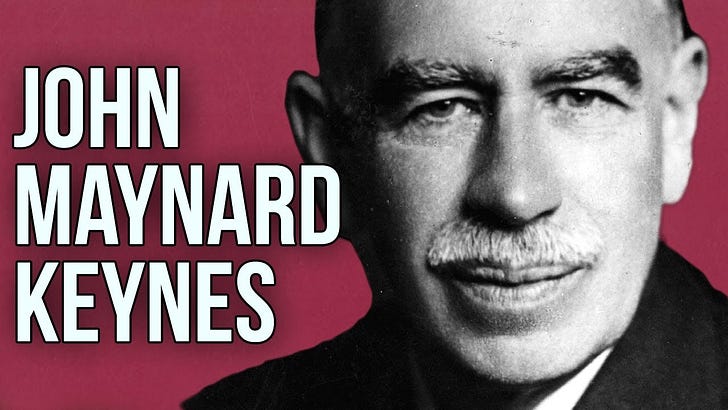John Maynard Keynes
Keynes, “In the long run, we’re all dead”
“On a long enough timeline, the survival rate for everyone drops to zero.”
―Chuck Palahniuk,Fight Club
https://www.simontaylorsblog.com/2013/05/05/the-true-meaning-of-in-the-long-run-we-are-all-dead/
27 page lesson plan See page 357 for WW1
Versailles
“If you put two economists in a room, you get two opinions, unless one of them is Lord Keynes, in which case you get three opinions.” — Winston Churchill.
'“It is better to be roughly right than precisely wrong."
"Americans are apt to be unduly interested in discovering what average opinion believes average opinion to be."
"When my information changes, I alter my conclusions. What do you do, sir?"
"If farming were to be organised like the stock market, a farmer would sell his farm in the morning when it was raining, only to buy it back in the afternoon when the sun came out."
"There is no harm in being sometimes wrong - especially if one is promptly found out."
"It would not be foolish to contemplate the possibility of a far greater progress still."
"Successful investing is anticipating the anticipations of others."
"The difficulty lies not so much in developing new ideas as in escaping from old ones."
"Markets can remain irrational longer than you can remain solvent."
"Ideas shape the course of history."
"The political problem of mankind is to combine three things: economic efficiency, social justice and individual liberty."
n December 1919 a former British official who had been present in Paris during the long negotiations leading to the Versailles peace treaty published a sixty-thousand-word tract. In just under two hundred pages, he first explained why the European order before the First World War had been fundamentally unstable; he then went on to attack those on the allied side who, in his opinion, had failed so miserably to construct a genuine peace; and finally (and at much greater length) he argued, with a battery of economic facts, that treating Germany generously would be a far wiser course of action than—as in fact happened—treating it like a pariah. Vengeance may have played to the gallery, and keeping Germany down may have made sense to those who had suffered so profoundly as a result of its actions between 1914 and 1918.
In a private letter to a friend, Keynes called Woodrow Wilson “the greatest fraud on earth.”
https://www.history.com/this-day-in-history/keynes-predicts-economic-chaos
Pedro
“In the essay "Economic possibilities for our grandchildren", written in 1930. Keynes predicts on that essay that within 100 years time mankind would solve its economic problem thanks to the increases on productivity, and would be able to cover the absolute needs leaving much more time for leisure.
The author distinguishes between absolute needs and relative needs. The needs of food, water or shelter, are absolute on the sense that we feel them whatever the situation of other human beings may be. Other needs satisfy the desire for superiority, and Keynes thinks that those may be insatiable, but he arrives to the conclusion that once the absolute needs are covered, we will prefer to devote our energies to non-economic purposes.
This is where his prediction, at least until now, has failed. The consumerist society where we live has convinced us that a second car, a bigger house or a flat TV will give us more satisfaction than more leisure time. I only hope that this will change before 2030 and the prediction becomes true in due time.”
see also
https://www.simontaylorsblog.com/2020/01/28/some-recent-books-that-help-explain-the-world/
https://www.simontaylorsblog.com/2015/01/18/the-oil-price-and-short-and-long-run-supply/
https://www.simontaylorsblog.com/2017/03/27/why-are-some-countries-richer-than-others/
https://www.simontaylorsblog.com/2021/03/15/the-case-for-bitcoin/

